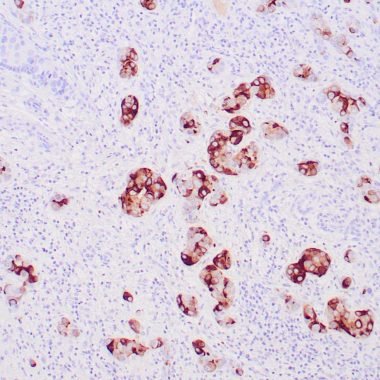Human breast tissue stained with anti-GCDFP-15 antibody using peroxidase-conjugate and DAB chromogen. Note luminal and cytoplasmic staining of glandular epithelial cells.
Related Products
It recognizes a protein of 15kDa, identified as Gross cystic disease fluid protein 15 (GCDFP-15). It is a major protein component of benign breast gross cysts. It is a known marker of breast cancer, as it is found in approximately 50% of all breast cancer specimens. GCDFP-15, also known as PIP, for prolactin inducible protein, is a prolactin and androgen-controlled protein. This antibody is useful in the identification of metastatic breast carcinoma, or fluid analysis.
Specifications
Species Reactivity:Humans; others not tested
Known Applications:Immunohistochemistry (formalin-fixed, paraffin-embedded tissues)
Supplied As:Buffer with protein carrier and preservative
Storage:Store at 2ºC to 8ºC
Control:Skin and breast
Visualization:Cytoplasmic
Isotype:IgG2b /κ
Immunogen:Recombinant human GCDFP-15 protein fragment (aa 41-146)
Ordering Information
Package Inserts
SDS

